Children from the LJC children’s clubs came in costume with their parents to celebrate Purim at the Lithuanian Jewish Community. There was dancing, playing and sampling of the delicious hamantashen baked by the Bagel Shop Café. A great time was had by all.
Purim at the Panevėžys Jewish Community
Purim is the spring holiday when we celebrate the rescue of the Jews from death in Babylon. On March 12 the Panevėžys Jewish Community began the celebration with chairman Gennady Kofman reading the Purim story out loud, the Book of Esther from the Bible which tells of the destruction facing the Jews living in Babylon and the miracle of their rescue due to the efforts of queen Esther, the Jewish wife of the Persian king. Not only were the Jews saved, they defeated the king’s evil vizier Haman who chose the day for the destruction of the Jews by casting lots, but who was himself punished. Many children attended the Panevėžys Jewish Community’s Purim celebration. There was a dining table for children, the children put on plays and watched films and concerts in connection with Jewish history. Purim is the happiest Jewish holiday and there was much song and much laughter. Everyone received a small gift as well.
Lithuanian Jewish Community Chairwoman Faina Kukliansky’s Greetings on March 11, Day of Restoration of Lithuanian Independence.
I wish all members of the community a happy holiday!
For Litvaks Lithuania is the land of our ancestors, and March 11, the day 27 years ago when Lithuanian independence was restored, is an important holiday for us, marking as well the beginning of the rebirth of the surviving Jewish community. March 11 is for each of us an exceptional and dear day, and we cannot allow ourselves to forget how important the state where we live and where our children grow is to us. In 1918 as the first Republic of Lithuania was being born her Jewish citizens volunteered to fight for Lithuanian freedom, and went on to foster the economic and social welfare of this state.
In the run-up to March 11, significant activity by the Lithuanian Jewish initiative group took place in 1988 dedicated to the rebirth of Jewish culture. After the Lithuanian independence movement Sąjūdis was established, Lithuanian Jews were faced with the dilemma of how Jewish relations with the Lithuanian national movement would develop as the wounds of the Holocaust remained painful, recalling the tragedy which took place in this country.
Along side the rebirth of Lithuanian independence, first came the rebirth of Jewish cultural activity, and the Jewish Cultural Association was the first to hold a congress, beginning the conversation about the destruction of the Jewish community during the Holocaust in 1989, for the first time since the decline of the Soviet era in Lithuania. I have to say Jewish-Lithuanian relations in the historical context, their evaluation and research began exactly with the rebirth of independence when there had to be an assessment of the Holocaust and the active role played by Lithuanians in it had to be admitted. There were also efforts made to help Jews restore their Jewish identity.
The Jewish communities in the shtetls were exterminated in the Holocaust, the shtetls are gone and Yiddish is no longer spoken in Lithuania. Currently the Jewish communities in Vilnius, Kaunas, Klaipėda, Šiauliai, Panevėžys and Švenčionys have been re-formed. We still dream of a revival of the Yiddish language.
In the recent past we have sensed the emergence of a new generation in Lithuanian society who are interested in Jewish history and the life of the Jews in Lithuania, and slowly but surely stereotypical thinking is fading away.
When we speak of the values of March 11, we underline human rights and freedoms and their necessary consolidation and growth. We hope for the generation who understand their importance and who cherish and protect these rights and freedoms, and who connect love for their native land with self-respect and respect for all of its citizens.
Bagel Shop Café Wishes You a Happy Purim and Offers Traditional Holiday Foods
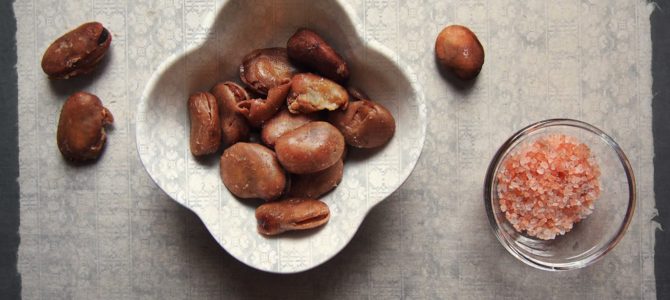
Hag Purim sameakh!
The Bagel Shop this week offers vegetarian bebelakh. During the Purim holiday period we are also making a variety of delicious treats including hamentashen and serving wine. We are making vegetarian dishes in honor of Queen Esther, who was a vegetarian. The Bagel Shop is located at Pylimo street no. 4 at street level in Vilnius.
Bean bebelakh, a recipe from Riva Portnaja’s mother Sara Berienė
Sara always made this dish for the Purim holiday where all dishes were vegetarian in honor of Queen Esther.
Soak a liter of large beans overnight, boil in salted water for a long time until they go soft. Served cold sprinkled with salt. Simple and delicious!
Free Hamentashen for Kids!
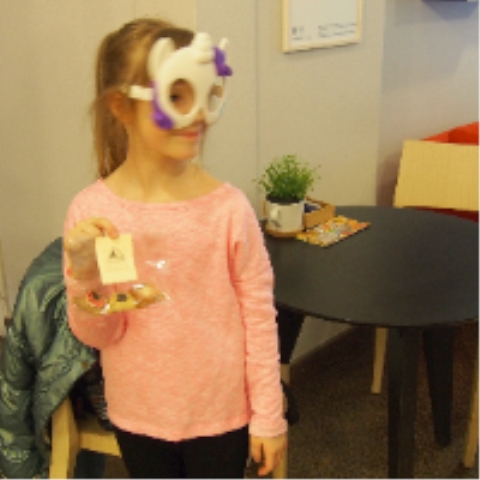
Children who come into the Bagel Shop Café in Purim masks or who say the secret code phrase–Hag Purim sameakh!–will receive a small gift.
This week Jews in Vilnius and around the world are baking the pastry called hamentashen, aka Haman’s ears, engage in an exchange of gift bags or Purim baskets of food and drink called mishloakh manot and put on the best parties of the year. Purim is the one holiday where adult Jews are allowed to get drunk and it considered customary to do so.
Our Litvak hamentashen are made with yeast according to recipes from families of Lithuanian Jewish Community members. Head baker Riva Portnaja tells how in her family they called hamantashen “ormentashen,” and her mother always added yeast to the dough. Classical Litvak hamantashen only used poppy seeds for filling and the triangles forming the base and top of the pastry are almost sealed close.
For more, see this facebook page.
Separate Program for Jewish Heritage Proposed
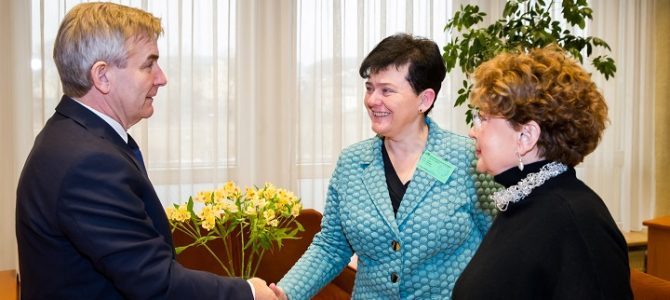
Diana Varnaitė. Photo courtesy Lithuanian Parliament
BNS–Director of Lithuania’s Cultural Heritage Department Diana Varnaitė is proposing separate financing for preservation of Jewish heritage. Lithuanian parliamentary speaker Viktoras Pranckietis approves the idea.
“We would think it would be appropriate to increase financing, and I told the speaker of parliament about our hope that it would be worthwhile for all of us together, with the leadership of the Ministry of Culture, to discuss … a separate line for Jewish heritage, not just for synagogues, because we have some [other] unique monuments, for example, the former religious school, the yeshiva building in Telšiai. These are sites in which we should take pride, as our own heritage, and which would make our [rural] regions more attractive and draws for tourists,” Varnaitė told BNS Wednesday after a meeting with the parliamentary chairman.
Parliamentary speaker press representative Dalia Vencevičienė said speaker Pranckietis expressed approval for the idea. “We have a policy direction on heritage and its preservation. The chairman would welcome the idea if the Ministry of Culture adopted a decision on a separate line in the budget,” she told BNS.
LJC Youth Clubs Celebrate Purim
Dear Community members,
The Lithuanian Jewish Community and the Vilnius Religious Jewish Community greet you on the upcoming holiday of Purim and invite you holiday celebrations on March 12.
The LJC youth clubs Ilan, Dubi and Dubi Mishpaha will hold a Purim celebration at 1:00 P.M. on March 12 on the third floor of the Lithuanian Jewish Community. Entrance is free but only those in costume and/or masks will be allowed in!
For more information contact Jelizaveta Šapiro at +370 65527411 or Pavel Guliakov at +370 68542463.
Were We Not Strangers in the Land of Lithuania?
by Geoff Vasil
Shrovetide is the Catholic period of confession and repentance marking the transition from winter to spring in the calendar year. In Lithuanian it’s called Užgavėnės, which is how the Lithuanian language used to indicate the period before Gavėnia, or Lent, the period leading up to Easter. Both the English and Lithuanian names are rather obscure—the English name almost sounds like “shroud” and to shrive is an archaic verb for confession and absolution by the Catholic priest—but the holiday is immediately recognizable to people around the world in its more popular names Carnival, Mardi Gras and Fat Tuesday.
Tuesday is really the last day of the Shrovetide period and represents European pagan/Catholic syncretism, the mixture of pagan bachanalia and saturnalia-type celebrations with the Christianity emanating out of Rome. The excesses and parties of Carnival have always been condemned by ecclesiastical authorities and yet have continued to the present. Carnival in many ways mirrors Halloween, which precedes All Saints’ Day, and in Lithuania there is a tradition of Shrovetide “trick-or-treaters,” children in costume going door to door seeking pancakes.
These costumed characters are a reflection of earlier and larger Shrovetide processions in Lithuania. In the post-1990 period of Lithuanian independence great efforts have been made to revive what was for all intents and purposes a dead tradition, public Shrove Tuesday events. The Soviet regime consciously sought to extinguish the tradition as a religious manifestation, but doing away with the traditional holiday was accomplished in different ways in different locations. The most effective manner of getting rid of the holiday was co-opting it in a more general Soviet “Ushering-out of Winter” holiday using a cast of costumed characters slightly more acceptable in Soviet society, but even the best-laid plans of the Soviet methodologists never really did away with the mischief inherent in the celebration and against which the Catholic Church had fought unsuccessfully for centuries.
Jewish Character in Lithuanian Shrovetide Processions an Example of Stereotypes

photo: Vytautas Daraškevičius
15min.lt
by Paulius Gritėnas
Israel’s ambassador to Lithuania Amir Maimon Wednesday issued a brief press release saying the long history of the Jews of Lithuania, destroyed monuments, names and works are only now being restored.
“We are moving ahead slowly to lead Jewish history out of the dark. And there’s a long road ahead of us… So far Jews in Lithuania are remembered mostly in a different way, as grotesque Shrovetide masks,” the statement read [in paraphrased translation from Lithuanian], going on to pose the rhetorical question of whether it isn’t time to adapt traditions in such a way they don’t offend the ethnic minorities of Lithuania.
Shrovetide is one of the oldest holidays in Lithuania and once upon a time was called Ragutis. It’s not surprising it contains an abundance of stereotypical thinking and visual codes demonstrating the simplified way we perceive our environment and people who are different in that environment.
Full story in Lithuanian here.
Statement by Lithuanian Jewish Community Chairwoman Faina Kukliansky on Shrovetide
Parliamentary Culture Committee chairman Ramūnas Karbauskis on his social media page invites everyone to celebrate Užgavėnės [Lithuanian Shrovetide, or Carnival] in Naisiai, Lithuania. Event organizers used illustrations reminiscent of anti-Semitic propaganda used by the Nazis. This was reported on the internet site of the newspaper Lietuvos žinios on February 24, 2017.
“At the invitation of the most influential member of parliament R Karbauskis [Karbauskis is the chairman of the ruling Peasants and Greens Union party], the public is called upon to celebrate Shrovetide at the Naisiai location, associated with the politician, where, it seems, anti-Semitic ideas not only thrive, but are a part of everyday communication. Under the header of “Big Shrovetide in Naisiai” on social media, the invitation and publicity for the event provides more than just an events program, it also includes [anti-Semitic] sayings…”
It didn’t take long for the Lithuanian public to react. A wave of outrage appeared, as did anti-Semitic comments on the internet. One of the leaders of the governing coalition of the nation, after all, presented an invitation to celebrate Shrovetide using fascist propaganda from 1939. “Lithuanians know the Holocaust began soon after that,” LJC chairwoman Faina Kukliansky commented.
“Following the February 16 march in Kaunas where it was hard to tell the ultra-nationalists from the patriots, this is continuing now into Shrovetide,” chairwoman Kukliansky said. “Is this the policy of the new ruling party? How are we to understand this? An innocent holiday celebration is transformed in the Naisiai announcement into clearly anti-Semitic jingoism, a return to the pre-World War II era. How should Lithuanian Jews feel? The Shrovetide celebration is a holiday, we understand ethnology, but this is beyond Shrovetide and even its masks, these are anti-Semitic Nazi masks which arrived in Lithuania from Hitler’s Germany. We would like to hear from Mr. Karbauskis’s lips whether he is or is not an anti-Semite. I am the chairwoman of the Lithuanian Jewish Community and I am requesting an answer to the question about what his views are regarding Jews, if he has the courage to display such masks in public. Existing Lithuanian laws criminalize the spreading of fascist propaganda,” Kukliansky said.
Bravery of a Japanese Diplomat on Exhibit in Cape Town
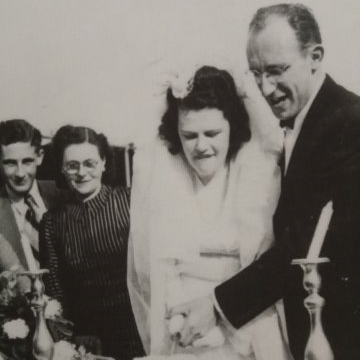
“Sugihara didn’t only save my grandfather, he also saved me. Because if not for Sugihara I may very well not be standing here today.” These were the words of Rebbetzen Sarah Feldman of the Gardens Synagogue in Cape Town, speaking on Monday at the opening of the Jewish Refugees in Shanghai exhibition at the South African Jewish Museum. Her grandfather, Rabbi Shimon Goldman, hailed from the city of Shedlitz in Poland.
by MOIRA SCHNEIDER | Feb 02, 2017
When Hitler invaded Poland, signalling the start of the Second World War, Rabbi Goldman, then a teenager, escaped to Lithuania and was fortunate to have been issued a visa by the Japanese consul there, Chiune Sugihara, acting contrary to his government’s express instructions.
“Sugihara was faced with a huge moral dilemma,” Rebbetzen Feldman related.
“His humanity won. Together with his brave wife Yukiko, this righteous couple worked non-stop issuing 300 visas a day – the amount that would usually take a month to issue.” In so doing, the couple saved 6,000 Jewish lives.
Full story here.
Lecture “Lithuanian Anti-Semitism, 1939-1940: Causes, Expressions, Trends”
The Sugihara Foundation Diplomats for Life organization invites you to the second lecture in the Northern Casablanca Academy series called “Lithuanian Anti-Semitism, 1939-1940: Causes, Expressions, Trends” to be held at 5:00 P.M., February 22, at the Sugihara House Museum in Kaunas. The lecturer is Dr. Linas Venclauskas.
For more information, see here.
About Jews and a Dream
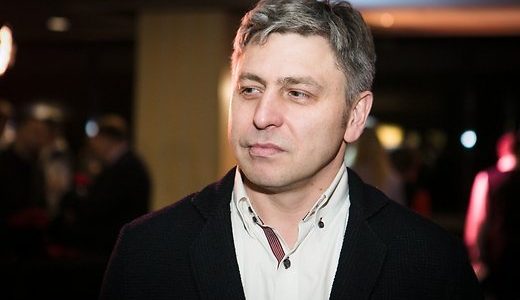
[Note: The proposal Mr. Ivaškevičius makes in the following opinion piece in no way reflects the position of the Lithuanian Jewish Community. In fact, on several points it contradicts the positions of the LJC stated publicly in the past, namely, regarding the rebuilding of the Great Synagogue in Vilnius. Also, at least three Litvak museums, much like the one he proposes, are currently in the planning stage, two in Vilnius, and one scheduled to open in the shtetl of Šeduva in late 2017 or early 2018. The following translation is presented to our readers merely for the sake of information and the interest of our readers.]
by Marius Ivaškevičius
www.DELFI.lt
Yes, again, about Jews. Although, not really, this is perhaps more about us. About Vilnius, really, of which they were a part, and now we are. And this time not about repentance, guilt or about what we’ve lost, on the contrary, about what we can still get back. I want to propose a plan for how our dead Jews could still serve us.
About Vilnius
I love this city and I always tell my foreign friends it is a hidden pearl. When you need peace, it is peaceful. When you want noise and excitement, it has something to offer. The beauty here is obvious, brick-and-mortar and alive, the old architecture, the beautiful men and women, in a word, something to look at. For a long time my stories hit a polite wall of promises: “yes, of course, we will have to go there someday.” Someday, never. But suddenly it began to work. As if my foreign friends had made an agreement among themselves, they began to flood into Vilnius, asking what they should see first in this city.
So I got the opportunity to look at Vilnius not through the eyes of an insider living here, but through the eyes of someone who had just arrived. And I realized Vilnius doesn’t have anything to offer them. The Old Town, sure, it’s charming. But that charm wears off after a half day. You can spend the evening and night on the weekends in the bars. Then what? Then they want museums, but here these, it turns out, are each more boring than the last. Old armor, weapons and glazed tiles they have already seen, the picture galleries are only of local significance, there are no masterpieces and it takes a real fanatic, a tourist dedicated to art, to “consume” what is on offer.
The only thing which is truly not disappointing is the theater. The theaters of Vilnius are world-class and many drama enthusiasts come just for this, to see Nekrošius, Tuminas and Koršunovas in their hometown. Perhaps sometimes they murmur after the show about a lack of subtitles or translation, but essentially they’re satisfied. The plays fill their evenings, and during the day, seeking new experiences, they visit the Museum of Lithuanian Theater and Cinema, certain that it will be of the same high caliber as our theater which it represents. But they find that same museum boredom instead. A stoppage of time and museum women knitting.
Celebrating February 16 at the Lithuanian Jewish Community with Scouts

The Lithuanian Scouts, the Polish Lithuanian Scouts Union and the Union of Lithuanian Jewish Students celebrated Lithuania’s pre-World War II independence day, February 16, together at the Lithuanian Jewish Community. Head of the Polish Lithuanian scouting organization and former director of the Pope John Paul II Gymnasium in Vilnius Adam Blaszkewicz, members of the Lithuanian Jewish Community, actors from the Russian Drama Theater and Polish, Lithuanian and Russian scouts spoke about freedom, civic-mindedness and history.
The event was held at the Lithuanian Jewish Community and was live-streamed on facebook.
ORT Sholem Aleichem Gymnasium principal Misha Jakobas also spoke at the event. “I always tell parents, if you want your child to make a career, if you see your future in Lithuania, you must know several important things. First, you must know the national language perfectly. If you go into the office of the director of an important company and start stuttering, if you write a document with mistakes, if you can’t form a complete sentence, then the director has the right to tell you to get out,” Jakobas was quoted by news internet site delfi.lt
Pope Says Anti-Semitism Opposite of Christian Values
“Unfortunately, anti-Semitism, which I reject in all forms of thinking which are the antithesis of Christian principles, is still very common in our time”, Pope Francis said in a meeting with representatives of the Anti-Defamation League, reports the website regions.ru.
The Pope also cited a document published 50 years ago, Nostra Aetate, which identified approaches to solving the problem of anti-Semitism. It specifically states that the Church “feels obliged to do everything possible to help our Jewish friends to overcome anti-Semitic tendencies.” Head of the Anti-Defamation League Jonathan Greenblatt called meeting fruitful.
The Anti-Defamation League is an American Jewish NGO and is considered one of the leaders in combating anti-Semitism.
Pope Francis also recalled his visit to Auschwitz last year, saying: “There are no adequate words to describe the horror and cruelty of sin that was going on there. I pray the Lord have mercy, and such tragedies are never repeated.”
Military History: The Career of a Flight Engineer from Zhitomir from the USSR to Afghanistan, to Independent Lithuania
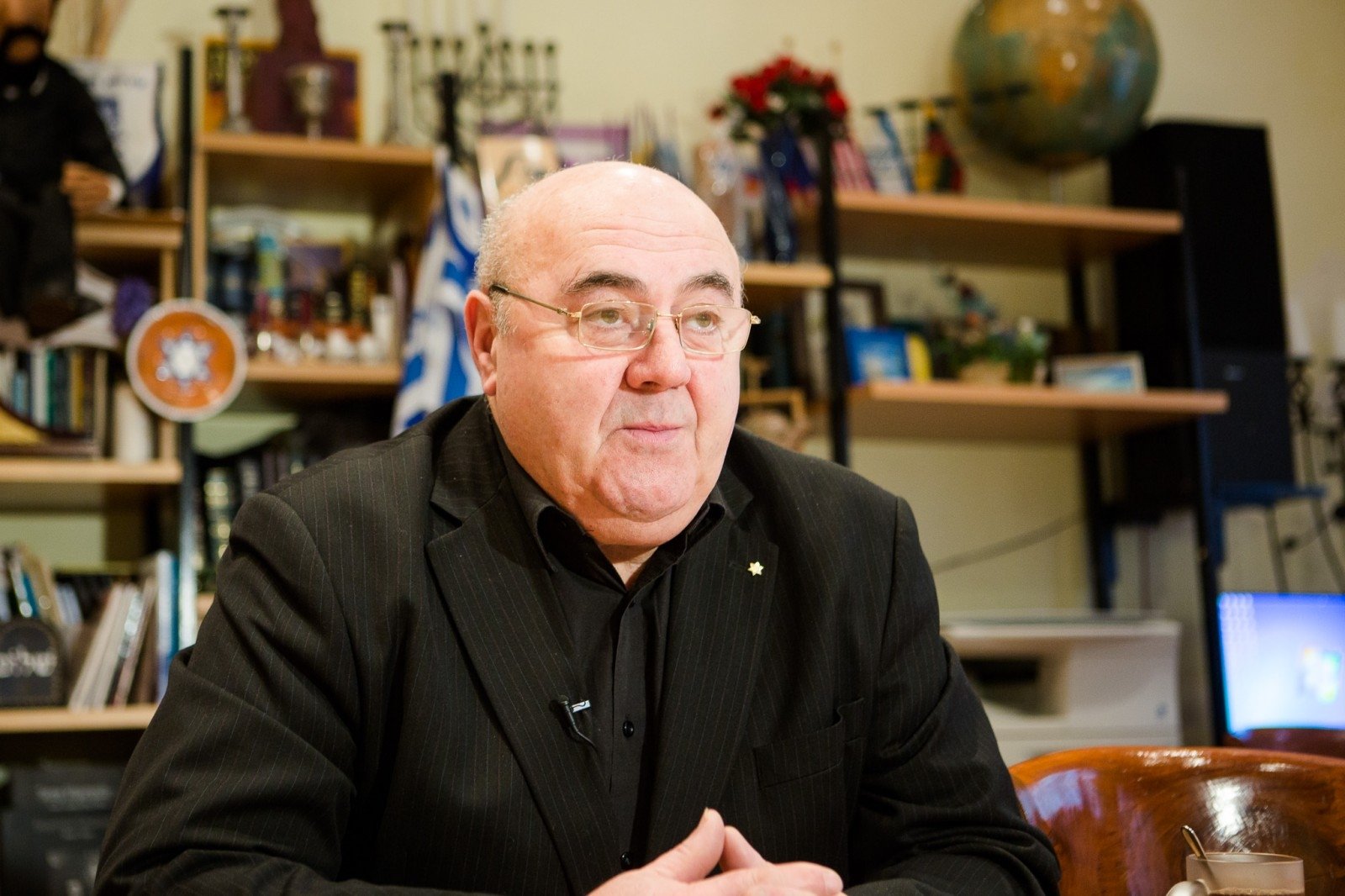
by Nataliya Zverko
ru.DELFI.lt
We met Gennady Kofman at a former girls’ school which now serves as the headquarters of the Panevėžys Jewish Community. Reporters were seated and served tea and cookies in a friendly atmosphere, with only the silent photographs on the walls before us to remind us 95% of the Jews resident in the Lithuanian city were murdered in the Holocaust.
Gennady Kofman, a native of Zhitomir, Ukraine, has been chairman of the Panevėžys Jewish Community since 2001, having returned to the city in 1972 after being graduated from the Kaliningrad Military Aviation School. For a long time he served in the post of software engineer for the Panevėžys military airfield’s radar system, and later flew transport missions in Afghanistan and Armenia. When Lithuania regained independence in 1991, he stayed here, and found himself in a new reality.
Full story in Russian here.
Serbian President Awards Efraim Zuroff Gold Medal
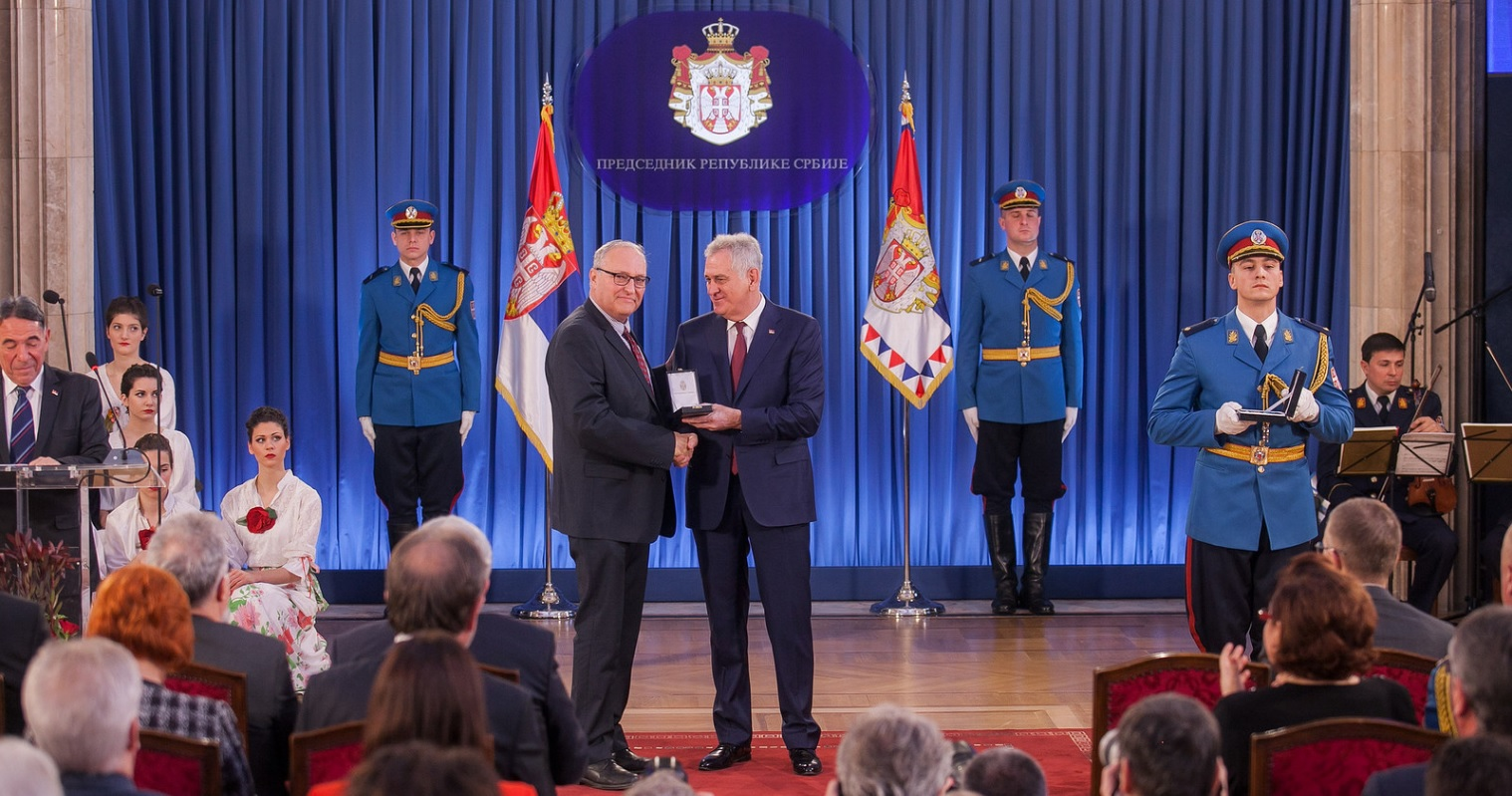
Serbia’s president Tomislav Nikolić presented Serbia’s Gold Medal for Merit to Dr. Efraim Zuroff, chief Nazi hunter and director for Eastern European affairs at the Simon Wiesenthal Center, on February 16 as part of celebrations of Sretenje, Serbia’s day of statehood. The award was presented for “exceptional achievements” by Dr. Zuroff and noted his “selfless dedication to defending the truth about the suffering of Jews, and also Serbs, Roma and other nationalities, during World War II.”
Zuroff was the first to be called to receive the award from the president’s hand and was one of only a few foreigners to be honored with the distinction. He is only one of two Israelis ever to have received the medal, along with Serbian-born Israeli justice minister Yosef “Tommy” Lapid. Efraim Zuroff has deep Litvak roots and has worked on Holocaust justice and education in Lithuania for many decades now.
Kaunas Ultranationalist March Ended by… Donald Trump?
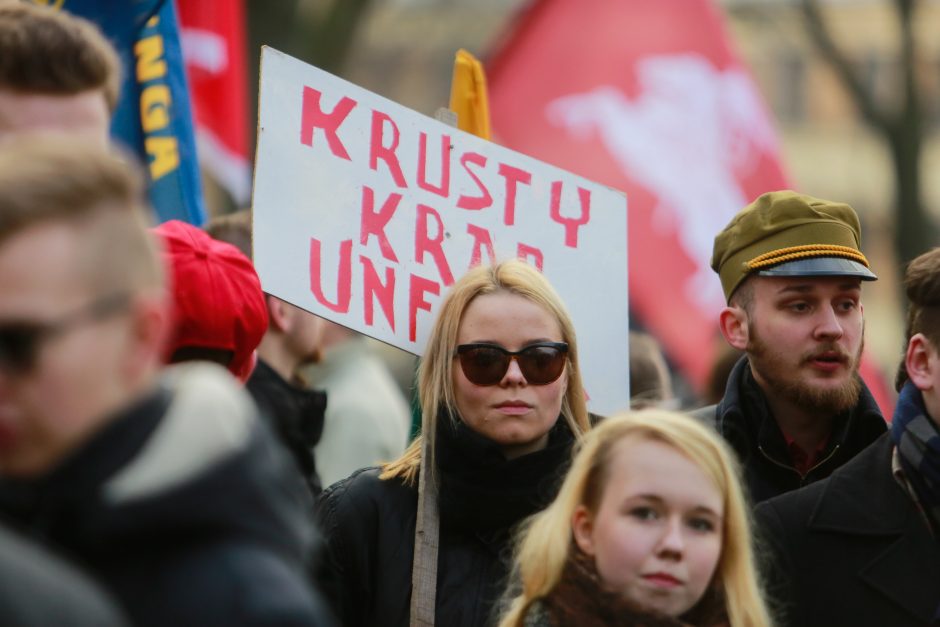
Rethinking hate: Annual Kaunas February 16 ultra-nationalist marchers turn whimsical as organizers look at joining mainstream young conservative movement. Photo by Elijau Kniežauskas, courtesy Kauno Diena.
by Geoff Vasil
The annual march by Lithuanian ultra-nationalists on the pre-WWII Lithuanian independence day, February 16, in Kaunas, Lithuania’s second largest city, saw record low turnout this year, 2017. According to media reports of police estimates, just under 150 people including parents with children came this year.
Organizers sought and received a permit for 500 marchers.
Even before the march took place this year, there were signs of disarray this year. Instead of the usual organizer, the Union of Lithuanian Nationalist Youth, private citizen and somewhat of a dissident member of that organization, Justinas Daunoras, applied for the permit with Tomas Skorupskas as co-organizer. Both were reportedly convicted of public displays of Nazi logos in the past, according to media reports.
“The core of the march remains the same, although the Union of Nationalist Youth no longer exists. Now this is a club of several people. But we wanted to celebrate the holiday and enjoy our hard-won freedom. But we didn’t want the hate which our leaders have propagated in the past,” Tomas Skorupskas told the Kaunas newspaper Kauno Diena.
Justinas Daunoras told the same newspaper he and his fellow marchers wanted to modernize tradition. “In the narrow sense, that we shouldn’t get stuck in old matters, things such as appearance or style, but instead get in step with the times. In the broader sense, in the context of a changing culture and civilization, tradition must make way and accommodate them.” Speaking before the march was held, he told Kauno Diena they expected the usual number of marchers, several hundred, but added that some were staying away because they were displeased by things which took place in earlier years at the march. Daunoras had expected new marchers to replace the ranks of those staying home.
Lithuanian National Radio and Television reported the march briefly last week under the headline “Nationalist Youth March Organizers Borrow Slogan from Donald Trump”:
Portrayal of Other Ethnicities in Shrovetide Traditions
In the run-up to the Lithuanian holiday of Užgavėnės (Shrovetide), the Vilna Gaon State Jewish Museum’s Tolerance Center will hold a discussion called Portrayal of Other Ethnicities in Shrovetide Traditions. The traditional holiday features people dressed up as Jews with masks with hooked noses. Speakers are to include Dr. Laima Anglickienė, the head of the cathedral of ethnology and folklore studies at Vytautas Magnus University in Kaunas; Libertas Klimka, an ethnologist and professor at the Lithuanian Educology University; the writer Dainius Razauskas and representatives from the Lithuanian Human Rights Center and the Equal Opportunities Ombudsman Service.
The discussion is open to the public and is to take place at 4:30 P.M. on February 21. The Tolerance Center is located at Naugarduko street no. 10/2 in Vilnius.
Japanese Violinist Yurina Arai Wins Heifetz Contest
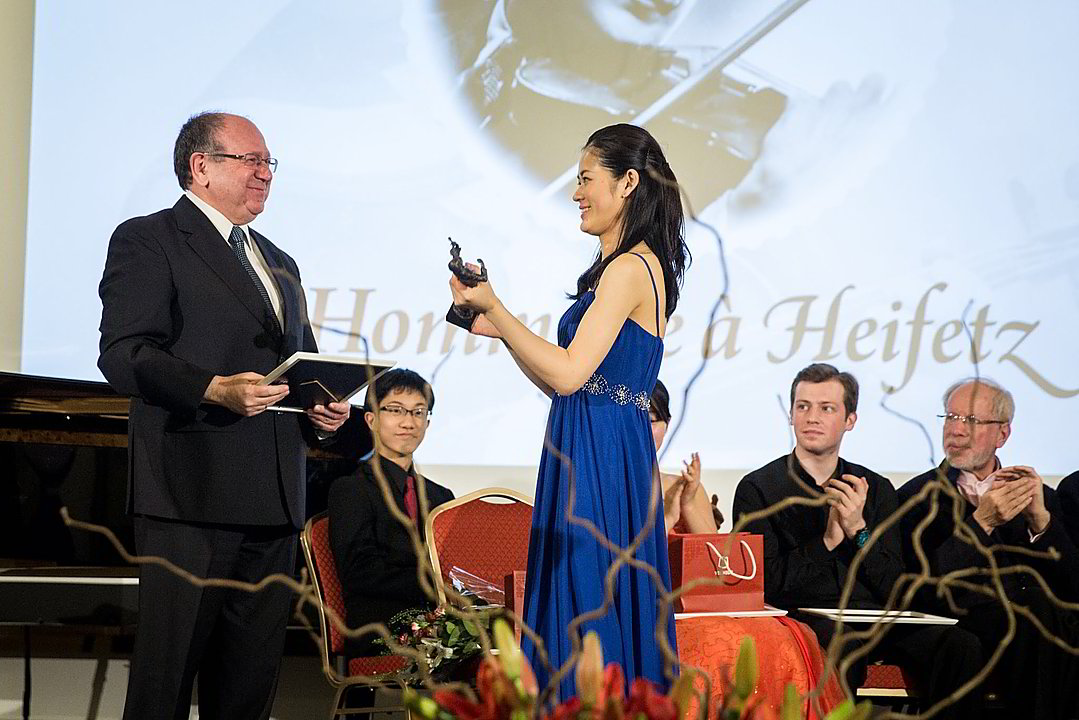
Yurina Arai has been named the winner of the Fifth Jascha Heifetz International Violin Competition in Vilnius, Lithuania. The 22-year-old Japanese violinist, who triumphed in the final with her performance of Tchaikovsky’s Violin Concerto, receives €10,000 and a number of performance opportunities. The student of Natsumi Tamai at the Tokyo University of the Arts won first prize at the Grumiaux Competition last year. The second prize worth €5,000 went to 17-year-old Dmytro Udovychenko from Ukraine, while third prize worth €2,000 went to 17-year-old R. Fukuda from Japan who won the Junior Division of the Menuhin Competition in 2014. Moscow Conservatory student 24-year-old Stepan Starikov and 17-year-old Japanese violinist Mayu Ozeki were awarded diplomas and €1,000. For the first time this year winners received a small sculpture of Heifetz by Lithuanian sculptor Romualdas Kvintas. The award was established by the Lithuanian Jewish Community. Professor Leonidas Melnikas who presented the prizes said “We want the winners to always remember Heifetz lived in Vilnius.”
More in Lithuanian here.

